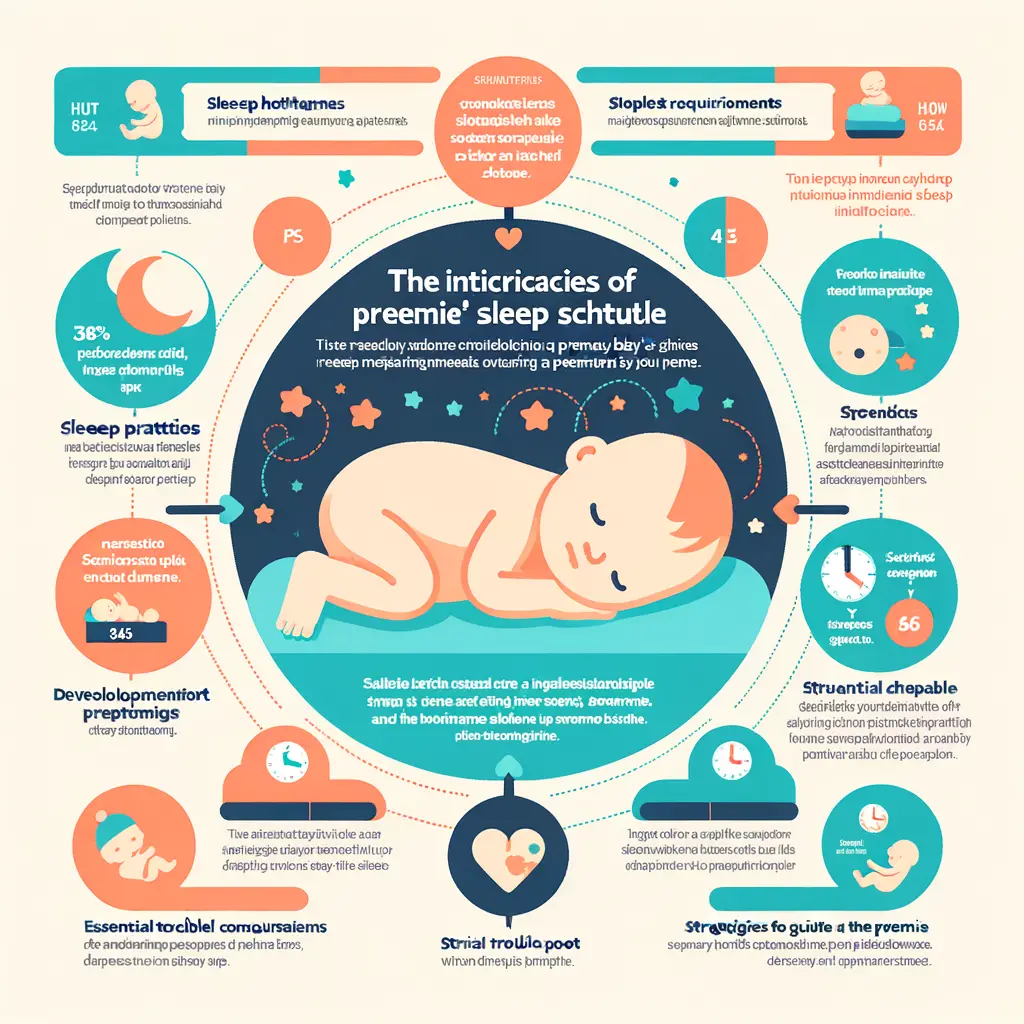Introduction to Preemie Sleep Patterns
Welcome to our comprehensive guide on preemie sleep patterns. In this section, we will explore the concept of preemie sleep and how it differs from full-term babies. Understanding these differences is crucial for parents and caregivers to provide the best care for their little ones.
Understanding the concept of preemie sleep
A ‘preemie’ or premature baby is one who is born before 37 weeks of gestation. Because they are born before their due date, preemies may have different sleep patterns compared to full-term babies. They often sleep for shorter periods and wake up more frequently. This is because their tiny bodies are still developing and they need to feed more often.
How preemie sleep patterns differ from full-term babies
Full-term babies typically sleep for longer stretches and have more predictable sleep patterns. On the other hand, preemies may have irregular sleep patterns. They may sleep for a few hours, then wake up for feeding, and then go back to sleep. This can be challenging for parents as it can disrupt their sleep schedule. However, it’s important to remember that this is a normal part of a preemie’s development and it will improve over time.
As we delve deeper into this topic, we will discuss more about the sleep schedule, requirements, habits, and issues related to preemie sleep. We will also provide tips on sleep training for preemies and how to understand their sleep development. Stay tuned!
Preemie Sleep Schedule

Understanding the sleep schedule of premature babies, also known as preemies, is crucial for their growth and development. This section will provide insights into how often preemies sleep and what a typical sleep schedule for a preemie looks like.
How often do preemies sleep?
Preemies often sleep for most of the day, with a total of about 16 to 20 hours. However, their sleep is usually in short bursts of 2 to 4 hours at a time. This is because their small stomachs can’t hold enough food to keep them satisfied for long, so they wake up frequently to eat.
Typical sleep schedule for a preemie
A typical sleep schedule for a preemie is not much different from a full-term newborn. They sleep in cycles of about 45 minutes of active sleep (when they may twitch, jerk, and move their eyes under their lids), and 20 minutes of quiet sleep (when they lie still and breathe regularly). Over the first few months, these sleep cycles will gradually start to lengthen and become more like those of a full-term baby.
Remember, every preemie is unique and may not follow these general patterns. It’s important to observe your baby’s individual sleep habits and consult with your pediatrician if you have any concerns. As your preemie grows and develops, their sleep patterns will change and become more predictable.
Understanding and supporting your preemie’s sleep needs can contribute significantly to their overall health and development. So, keep a close eye on their sleep schedule and make sure they’re getting the rest they need.
Sleep Requirements for Preemies
Understanding the sleep requirements for premature babies, often referred to as preemies, is crucial for their growth and development. Let’s delve into how much sleep preemies need and the factors that can affect their sleep requirements.
How much sleep do preemies need?
Preemies typically require more sleep than full-term babies. On average, they need about 16 to 20 hours of sleep per day, divided into several naps throughout the day and night. However, these sleep periods may be shorter and more frequent than those of full-term babies due to their immature nervous systems. It’s important to remember that each preemie is unique and may have different sleep needs.
Factors affecting sleep requirements for preemies
Several factors can affect the sleep requirements of preemies. These include their age, weight, and overall health status. For instance, younger and smaller preemies may need more sleep than older and larger ones. Additionally, preemies with health complications may require more rest to aid their recovery and growth. Environmental factors, such as noise levels and lighting in the nursery, can also influence a preemie’s sleep patterns.
In conclusion, understanding and meeting the sleep requirements of preemies is vital for their well-being. Parents and caregivers should observe their preemie’s sleep patterns and consult with healthcare professionals to ensure their preemie is getting the right amount of sleep.
Premature Baby Sleep Habits

Understanding the sleep habits of premature babies can be a challenge for many parents. However, with the right knowledge and approach, you can foster good sleep habits in your preemie. Let’s delve into the common sleep habits of premature babies and how you can encourage proper sleep patterns.
Common Sleep Habits
Before we discuss how to foster good sleep habits in preemies, it’s essential to understand their common sleep habits. This understanding will help you better support your baby’s sleep needs.
Understanding the sleep habits of premature babies
Premature babies, also known as ‘preemies’, often have different sleep habits compared to full-term babies. Preemies tend to sleep more but in shorter bursts. They may sleep for a few minutes to a few hours at a time, waking up frequently for feedings. Their sleep patterns can be irregular, with periods of wakefulness at any time of the day or night. This is because their internal body clocks, which regulate sleep and wake cycles, are not fully developed yet. [1]
How to foster good sleep habits in preemies
Encouraging good sleep habits in preemies can be achieved with a few simple strategies. First, try to establish a routine. Regular feeding, changing, and sleeping times can help regulate your baby’s body clock. Second, create a calm and quiet sleep environment. This can include dimming the lights and reducing noise levels. Lastly, remember that every baby is unique. What works for one preemie may not work for another. Be patient, and don’t hesitate to seek advice from healthcare professionals if you’re struggling. [2]
Uncommon Sleep Habits
While most preemies develop typical sleep patterns, some may exhibit uncommon sleep habits. It’s essential to identify and address these unusual habits early to ensure your preemie’s healthy growth and development.
Identifying and addressing unusual sleep habits in preemies
Uncommon sleep habits in preemies can manifest in various ways. Some preemies may have difficulty falling asleep, while others may wake up frequently during the night. Some may sleep for extended periods, while others may have irregular sleep schedules.
Identifying these unusual habits can be challenging, but there are a few signs to look out for. If your preemie seems excessively sleepy or has difficulty staying awake during feeding times, it could indicate an uncommon sleep habit. Similarly, if your preemie is frequently restless or seems uncomfortable during sleep, it could be a sign of an unusual sleep pattern.
Addressing these uncommon sleep habits often involves adjusting your preemie’s sleep environment and schedule. Ensuring a quiet, dark, and comfortable sleep environment can help your preemie establish regular sleep patterns. Similarly, maintaining a consistent sleep schedule – including regular naptimes and bedtimes – can help regulate your preemie’s sleep cycle.
However, it’s important to remember that every preemie is unique, and what works for one may not work for another. If you’re concerned about your preemie’s sleep habits, it’s always best to consult with a healthcare professional. They can provide personalized advice and guidance based on your preemie’s specific needs and circumstances.
Remember, understanding and addressing uncommon sleep habits in preemies is crucial for their health and development. By staying informed and proactive, you can help your preemie establish healthy sleep habits that will benefit them in the long run.
How Long Do Preemies Sleep?

Understanding the sleep patterns of premature babies, also known as preemies, can be quite different from full-term infants. The sleep duration and patterns may vary significantly due to various factors. Let’s delve into the details.
Understanding the Sleep Duration of Preemies
Preemies often sleep for a total of 16 to 20 hours a day in the first few weeks after birth. However, their sleep is not continuous. They usually sleep in short bursts of 30 minutes to 3 hours, waking up frequently for feedings. This is because their tiny stomachs cannot hold enough food to keep them satisfied for long periods.
As they grow and develop, their sleep patterns start to change. By the time they reach their original due date, preemies usually sleep for about 14 to 17 hours a day, similar to full-term newborns. However, this can vary from baby to baby.
Why Do Preemies Sleep So Much?
Preemies sleep a lot because sleep is crucial for their growth and development. During sleep, their bodies work hard to catch up on the growth that should have happened in the womb. This is why they spend more time in rapid eye movement (REM) sleep, which is believed to be important for brain development.
Moreover, preemies have a higher metabolic rate than full-term babies, which means they burn energy more quickly. Sleep helps them conserve energy for growth and development.
In conclusion, understanding the sleep patterns of preemies can help parents and caregivers provide the best care for these tiny fighters. Remember, every baby is unique, and what works for one may not work for another. Always consult with your healthcare provider for any concerns about your preemie’s sleep.
Sleep Training for Preemies
Sleep training is an important part of a preemie’s development. It helps establish a healthy sleep pattern, which is crucial for their growth and overall well-being. But when is the right time to start sleep training for preemies? Let’s delve into this topic.
When to Start Sleep Training
Identifying the right time to start sleep training for preemies can be a bit challenging. It’s important to remember that every baby is unique, and what works for one might not work for another. However, there are some general guidelines that can help you make an informed decision.
- Developmental readiness: Preemies may need more time to reach the developmental milestones that full-term babies achieve by a certain age. It’s recommended to wait until your preemie has reached the adjusted age of 4-6 months before starting sleep training. This is the age they would have been if they were born on their due date.
- Weight: A preemie should weigh at least 5-6 pounds before you start sleep training. This is because smaller babies need to eat more frequently, even during the night, to gain weight.
- Doctor’s approval: Always consult with your pediatrician before starting sleep training. They can provide personalized advice based on your baby’s health and development.
Remember, sleep training is not a one-size-fits-all process. It’s important to be patient and flexible. Your preemie’s sleep patterns will gradually improve over time, so don’t be discouraged if progress seems slow. The key is to create a consistent sleep routine and stick to it.
Effective Sleep Training Techniques
When it comes to sleep training for preemies, there are several effective techniques that can be used. These techniques are designed to help your preemie develop healthy sleep habits and ensure they are getting the rest they need. Let’s explore some of these techniques.
- The Gradual Retreat Method: This technique involves gradually moving further away from your baby’s crib each night until you’re no longer in the room. This helps your preemie get used to falling asleep without your presence. It’s a gentle method that can be very effective, but it requires patience.
- The Pick Up, Put Down Method: This technique involves picking up your preemie when they start to fuss or cry, comforting them until they’re calm, and then putting them back down in their crib. This can help your baby learn to self-soothe and fall asleep on their own.
- The Fading Method: This technique involves reducing your involvement in your baby’s sleep routine over time. For example, you might start by rocking your baby to sleep, then move to just holding them, then sitting next to the crib, and so on. This can help your preemie gradually adjust to falling asleep without your help.
- The Scheduled Awakenings Method: This technique involves waking your preemie up at the same times each night and then helping them fall back asleep. This can help regulate your baby’s sleep schedule and make it easier for them to fall asleep and stay asleep.
Remember, every baby is different, and what works for one preemie might not work for another. It’s important to be patient and flexible, and to try different techniques until you find what works best for your baby. For more information, you can visit the Wikipedia page on infant sleep training.
Preemie Sleep Issues
Understanding the sleep issues that preemies often face is crucial for parents and caregivers. These issues can be different from those of full-term babies, and knowing how to address them can significantly improve the quality of life for both the baby and the family.
Common sleep issues in preemies
Preemies, or premature babies, often face a variety of sleep issues. These can include:
Irregular sleep patterns: Preemies may not follow the typical sleep-wake cycle that full-term babies do. This can result in them being awake at unusual hours.
Difficulty falling asleep: Preemies may have trouble falling asleep or staying asleep. This can be due to a variety of factors, including discomfort, hunger, or overstimulation.
Apnea of prematurity: This is a condition where a preemie stops breathing for 20 seconds or more during sleep. It’s more common in preemies because their respiratory system is not fully developed. Learn more about Apnea of prematurity here.
How to address preemie sleep issues
Addressing sleep issues in preemies can be challenging, but there are several strategies that can help:
Create a soothing sleep environment: A quiet, dark room with a comfortable temperature can help your preemie sleep better.
Establish a bedtime routine: A consistent routine can help signal to your preemie that it’s time to sleep. This could include activities like a bath, a feeding, and a lullaby.
Monitor for signs of apnea: If your preemie has been diagnosed with apnea of prematurity, you’ll need to monitor them closely during sleep. This may involve using a home apnea monitor.
Consult with a pediatrician: If your preemie’s sleep issues persist, it’s important to consult with a pediatrician. They can provide guidance and may refer you to a sleep specialist if needed.
Remember, every preemie is unique and what works for one might not work for another. It’s important to be patient and persistent in finding solutions that work for your baby.
Newborn Preemie Sleep
When it comes to newborn preemies, understanding their sleep patterns and knowing how to help them sleep better is crucial. In this section, we will delve into these topics to provide you with the necessary knowledge and tools.
Understanding the sleep patterns of newborn preemies
Newborn preemies, or premature babies, often have different sleep patterns than full-term babies. They tend to sleep more but in shorter bursts. This is because their immature nervous systems have not yet developed the ability to follow a regular sleep schedule. They may sleep for a few minutes to a few hours at a time, waking up frequently for feedings.
It’s also important to note that preemies may have more active sleep (also known as REM sleep) than full-term babies. This is a lighter stage of sleep where dreaming occurs, and it’s essential for brain development. However, it also means that preemies may wake up more easily.
How to help a newborn preemie sleep better
Helping a newborn preemie sleep better involves creating a conducive sleep environment and establishing a routine. Here are some tips:
Create a soothing environment: Keep the room quiet, dark, and cool. Consider using a white noise machine to block out disruptive noises.
Establish a routine: Try to feed, change, and put your baby to sleep at the same times each day. This can help regulate their internal clock and promote better sleep.
Swaddle your baby: Swaddling can help preemies feel secure and prevent them from waking up due to the startle reflex.
Limit stimulation: Avoid playing with your baby during night feedings and changes. Keep the lights low and your voice soft to help them understand it’s not playtime.
Remember, every baby is unique, and what works for one might not work for another. It’s important to be patient and flexible as you figure out what helps your preemie sleep best.
Preemie Sleep Development
Understanding the sleep development of premature babies, also known as preemies, is crucial for their growth and overall health. This section will explore how preemie sleep develops over time and what you can expect as your preemie grows.
How Preemie Sleep Develops Over Time
Preemie babies often have different sleep patterns compared to full-term babies. In the initial weeks, preemies may sleep for short periods and wake up frequently. This is due to their immature nervous system. However, as they grow, their sleep patterns start to develop and become more like those of full-term babies.
By the time they reach their original due date, most preemies have a sleep pattern that includes longer periods of sleep and fewer awakenings. It’s important to note that every preemie is unique, and their sleep development can vary.
Studies have shown that by the time preemies reach about three months corrected age (their age calculated from their original due date), they begin to consolidate their sleep. This means they start to sleep for longer periods at a time. [source]
What to Expect in Terms of Sleep as Your Preemie Grows
As your preemie grows, you can expect gradual changes in their sleep patterns. In the first few weeks, your preemie might sleep for most of the day, waking up only for feeding. As they grow, they will start to stay awake for longer periods during the day.
By the time they reach six months corrected age, most preemies have a sleep pattern similar to full-term babies of the same age. They may sleep for about 14 to 17 hours a day, including naps. However, keep in mind that every baby is unique, and these are just general guidelines.
It’s also important to remember that preemies may have more difficulty transitioning between sleep stages due to their immature nervous system. This can lead to more frequent awakenings. But don’t worry, this is a normal part of their development and will improve over time.
In conclusion, understanding your preemie’s sleep development can help you better support their growth and health. Keep in mind that every preemie is unique and their sleep patterns can vary. If you have any concerns about your preemie’s sleep, don’t hesitate to consult your pediatrician.
Understanding Preemie Sleep
As we delve deeper into the world of preemie sleep, it’s essential to understand the unique patterns and behaviors that characterize their rest. This understanding will help parents and caregivers provide the best care for these little ones. Let’s explore some key takeaways and case studies on preemie sleep.
Key Takeaways About Preemie Sleep
Preemies, or premature babies, often have different sleep patterns compared to full-term babies. Here are some important points to remember:
Preemies spend more time in REM sleep, which is lighter and more easily disturbed.
They may have irregular sleep cycles, sleeping for short periods and waking frequently.
Preemies may need more sleep overall, as sleep is vital for their growth and development.
It’s important to create a quiet, peaceful sleep environment for a preemie, as they can be more sensitive to noise and light.
Case Studies on Preemie Sleep
Scientific research provides valuable insights into preemie sleep patterns. Let’s look at a couple of case studies:
A study published in the Pediatrics Journal found that preemies who were exposed to a consistent daily routine had improved sleep patterns and better weight gain.
Another study in the Journal of Perinatology showed that preemies who were given a gentle massage before bedtime had longer and more restful sleep.
In conclusion, understanding preemie sleep is crucial in providing the best care for these little ones. By being aware of their unique sleep patterns and implementing strategies to promote restful sleep, we can support their growth and development in the best possible way.














